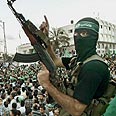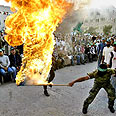

Hamas could one day amend a charter calling for the destruction of Israel and hold negotiations with the Jewish state, a political leader of the Islamic militant group in the West Bank said.
"The charter is not the Koran," Mohammed Ghazal told Reuters in an interview in Nablus on Tuesday.
"Historically, we believe all Palestine belongs to Palestinians, but we're talking now about reality, about political solutions ... The realities are different."
The unprecedented comments by Mohammed Ghazal clashed with recent pronouncements of more senior Hamas officials in Gaza.
But they reflected an apparent shift in Hamas toward the political mainstream and to winning greater world acceptance in the run-up to Palestinian parliamentary elections and after Israel's pullout from the Gaza Strip.
Ghazal said it was still early to talk about recognizing Israel "while Israel doesn't recognize me as the victim."
He said any Hamas talks with Israel would still depend on its withdrawal from the West Bank and East Jerusalem to allow an independent state as well as a so called "right of return" for Palestinian refugees who fled in 1948 and their descendants.
He said there was a "strong belief" that those conditions were never likely to be met.
"The Israelis should reach that stage when they feel they should negotiate with us and at that time I don't think there will be a problem of negotiating with the Israelis," said Ghazal.
Talks with Israel?
"The idea of negotiating is not something problematic and is not a dogma," he said at his office in an-Najah university, where he is a professor of engineering.
Hamas, a terrorist group blacklisted by the United States and Europe, has been behind suicide bombings and rocket attacks in a Palestinian intifada that began in 2000 after talks collapsed.
Unlike the Palestinian Authority of Chairman Mahmoud Abbas, Hamas has stood for replacing Israel with an Islamic state rather than a state in peace alongside it.
'If elections delayed, Hamas may establish its own authority'
Hamas, after being weakened militarily by Israeli raids and assassinations, has spoken of a temporary 'calming down period' since February and is preparing to take part in parliamentary elections for the first time in January.
Abbas is under pressure from Israel and the United States to start disarming the terror group as part of a peace "road map," and Israel has ruled out statehood talks before then, but Hamas refuses and Abbas has shied from the measure, fearing internal strife.
Objecting to Hamas participation in the parliamentary election, Prime Minister Ariel Sharon has said Israel could hinder the ballot if Hamas does not disarm and change its charter.
Ghazal said such Israeli statements would only serve to strengthen the Hamas position.
He said he still feared that Israel and the United States could press Abbas to put off the already delayed elections given their concerns that Hamas could do well against a dominant Fatah movement weakened by a record of mismanagement and corruption.
But he said that if elections were not held it would delegitimize Abbas and the Palestinian Authority and that in such a case Hamas could move to establish its own authority.
"There will be parallel authorities," he said.
Meanwhile, a senior Hamas official, Said Siyam, told Reuters that the organization has committed itself to ending its 'military marches' in a meeting with Mahmoud Abbas in Gaza city. But Siyam said that the move did not indicate a future disarming by Hamas.















